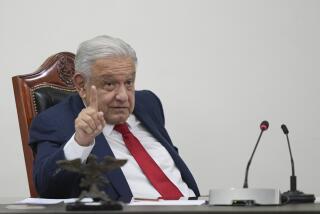As Obama and Castro meet, Cuba says embargo threatens full relations
- Share via
UNITED NATIONS _ Cuban Foreign Minister Bruno Rodriguez warned Tuesday that the embargo on his country poses a serious impediment to fully restoring relations with the United States, saying that the Obama administration’s steps so far haven’t amounted to “substantial changes” to the Cold War-era restrictions.tmpplchld The remarks came moments after President Barack Obama and Cuban leader Raul Castro shook hands in a rare face-to-face meeting in New York, their first encounter on U.S. soil since diplomatic relations were restored last summer after a five-decade break.tmpplchld Rodriguez described the talks on the sidelines of the U.N. General Assembly as unfolding in a “respectful and constructive climate,” though he added that Obama’s measures to remove trade and travel restrictions were no substitute for full removal of what the Cubans call “the blockade.”tmpplchld “The executive decisions adopted so far have a very limited value, a very limited scope,” Rodriguez told reporters at the United Nations. He added that “the pace of the process toward normalization will depend on the lifting of the blockade.”tmpplchld Obama repeatedly has called for an end to the embargo, but only the U.S. Congress can lift it in full, a prospect Republican leaders and some high-profile Democrats reject until the Communist regime in Havana allows for broader human rights and political expression.tmpplchld The next test of the thawing relations comes Oct. 27, when the Cubans take their embargo vote to the United Nations for the 24th year. For years, Cuba has won overwhelming international support for a condemnation of the embargo, and Rodriguez said the Castro government is eager to see how the U.S. votes next month.tmpplchld Last year, 188 of the 193-nation assembly voted for the nonbinding resolution, with only the United States and Israel voting against it. Rodriguez repeated the vote tally to underscore his point that the embargo only “causes isolation and discredit to the foreign policy of the United States.”tmpplchld “I will be waiting for Oct. 27 to see what happens,” he said.tmpplchld Privately, U.S. diplomats have said they’re considering an abstention, which would represent a break in longtime U.S. policy. But there’s been no public announcement and a brief White House statement Tuesday on the Obama-Castro meeting didn’t give any hints.tmpplchld tmpplchld Officially, the administration line was that the two leaders met to discuss the recent visit of Pope Francis to both countries and to spell out “additional steps each government can take to deepen bilateral cooperation.”tmpplchld “It was an opportunity for the two leaders to continue their consultations about some of the regulatory changes that are being made by the United States,” White House spokesman Josh Earnest told reporters after the meeting.tmpplchld tmpplchld “The president also reaffirmed our commitment to see the Cuban government do a better job of not just respecting but proactively protecting the basic human rights of the Cuban people, and we continue to believe a deeper engagement, deeper people-to-people ties, deeper economic engagement between the United States and Cuba, will have the effect of moving the government and the nation in a positive direction,” Earnest said.tmpplchld tmpplchld Members of the media were allowed in the room just long enough to see the two leaders shake hands and to catch Castro laughing as he stood up and realized how much taller Obama is. Otherwise, the meeting was private _ the two leaders and their respective advisers. The U.S. side included Secretary of State John Kerry, U.N. Ambassador Samantha Power and senior adviser Ben Rhodes.tmpplchld The talks Tuesday were the second time Obama and Castro have met; the previous encounter was during the Summit of the Americas in Panama in April. They’ve also spoken by telephone.tmpplchld tmpplchld This week marked Castro’s United Nations debut. He gave three speeches defending Cuban foreign policy, denounced the international order as selfish and exclusive, and said the United States and Europe must get a handle on the refugee crisis that they helped to “generate” through interventions in the Middle East and North Africa.tmpplchld The Cubans also repeated their typical list of demands of the Americans in order to reach full normalization: lifting the embargo, returning the Guantanamo Naval Base, ceasing broadcasts and programs they say threaten Cuban sovereignty, and paying out compensation to people and companies for embargo-related damages.tmpplchld ___tmpplchld (Lesley Clark contributed to this report from Washington.)tmpplchld tmpplchld ___tmpplchld (c)2015 McClatchy Washington Bureautmpplchld Visit the McClatchy Washington Bureau at www.mcclatchydc.comtmpplchld Distributed by Tribune Content Agency, LLC.tmpplchld
More to Read
Sign up for Essential California
The most important California stories and recommendations in your inbox every morning.
You may occasionally receive promotional content from the Los Angeles Times.












